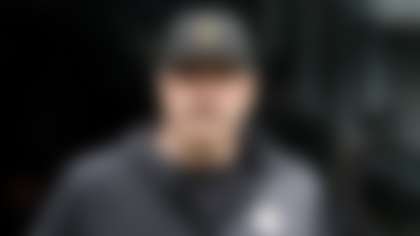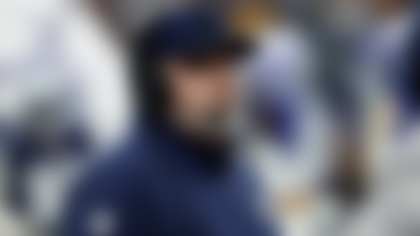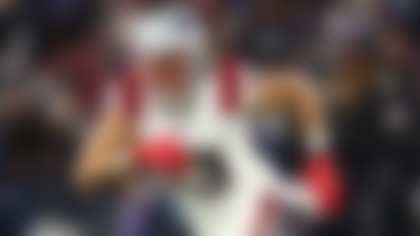BALTIMORE -- With just one good arm, Ray Lewis still plays as well as most linebackers in the NFL. The good news for the Ravens, and the bad news for the rest of the league, is that it appears he still has two good arms.
That wasn't so clear just a few days ago.
The Ravens need a healthy Lewis to remain among the AFC's powers, and it looked for a time last week that they may not have had him. So it is hardly stretching a point to say that Lewis' recovery between last Monday night's opening defeat at Cincinnati and Sunday's game against the New York Jets went a long way toward saving the Ravens' season.
And, even if Lewis didn't save the season, he surely saved this game.
Baltimore was on the verge of blowing a 17-point lead on Sunday when, with 1:03 remaining in the fourth quarter, Lewis intercepted a deflected pass in the end zone to preserve the 20-13 victory.
Thus did the Ravens avoid an 0-2 start which, in the past, has proved virtually impossible to overcome. Only one of 41 Super Bowl winners started a season with two defeats, and that came with an asterisk -- Dallas in 1993, which lost the first two games while Emmitt Smith was a contract holdout. Brian Billick, the Ravens' coach, said he was pretty sure all week that Lewis would be ready to play, because Lewis was able to finish the Monday night game after suffering an injury to his right triceps in the first quarter. But it was not quite so clear to outsiders, because Lewis essentially played that game with only his left arm.
"It wasn't a problem at all," Lewis said. "I knew in the pre-game that it was fine."
Lewis is perhaps the most irreplaceable player on the Ravens, even more than quarterback Steve McNair, who did not play Sunday due to a groin strain. Offensive tackle Jonathan Ogden also sat out the game because of an injured foot, and defensive end Trevor Pryce left the game after sustaining a broken wrist.
Thus, with the injury list growing and his team already the first of the AFC's Big 4 -- with the Patriots, Chargers and Colts -- to lose a game, Billick had to remind himself it's a long season. And the Ravens are likely to get healthier, both physically and in the standings, because their schedule the next several weeks is far from daunting.
"We're a pretty resilient team," said tight end Todd Heap. "Everybody's asking all the questions last week, 'What are you going to do, what are you going to do?' Well, the next guy steps up, and you have to fill those shoes one way or another. You're not just going to throw in the towel and give up."
Adam Terry, a third-year player, took over at left tackle for Ogden. Former first-round draft choice Kyle Boller took over at quarterback, making his first start since 2005, and showed how far he has come.
Boller completed 23 of 35 passes for 185 yards and two touchdowns and, significantly, neither threw an interception nor took a sack. He got the ball out of his hands quickly, showed some deft play-faking ability, and set up a touchdown with a nifty 12-yard scramble out of trouble.
"He obviously showed some maturity," said Heap, who caught seven passes for 76 yards and one touchdown. "He showed he'd been in the offense awhile, not only the throws he made, but the passes he threw away."
Billick said Boller looked "a lot calmer" in the pocket than he did earlier in his career, and that was significant against a Jets' defense that showed a lot of different looks. Boller's work also appeared to justify the Ravens' recent decision to sign the fifth-year quarterback to a contract extension when many thought they would make a play for Byron Leftwich, who had been released by Jacksonville.
None of Baltimore's next five games is against a team that finished the 2006 season with a winning record -- Arizona, Cleveland, San Francisco, St. Louis and Buffalo. Billick said he expects both McNair and Ogden back soon, surely before the end of that stretch and before the Ravens begin a six-week odyssey that will include games against five significant opponents -- Pittsburgh, Cincinnati, San Diego, New England and Indianapolis.
For Billick, his early experiences working with Bill Walsh, the Hall of Fame coach who died in July, are coming in handy as his team works through its early-season injury problems.
"It is so hard to keep the proper perspective," Billick said.
Ultimtately, the success of the Ravens will rest heavily on their defense, which feeds off Lewis, both his emotion and his talent. That's why most people thought his injury was the team's biggest problem, and why his quick healing was so important.
Although the Ravens' defense struggled in the fourth quarter against the comeback attempt by Kellen Clemens, the Jets' backup quarterback (Chad Pennington did not play due to injury), it was one play in the third quarter that really emphasized Lewis' importance. He blitzed to the left side of the Jets' offense and occupied two blockers. Safety Gerome Sapp then knifed in behind Lewis and sacked Clemens.
Yet that defense still permitted Clemens, in his first NFL start, to pass for 176 yards in the fourth quarter and make it a nail-biter. The game probably would have gone to overtime had Jets receiver Justin McCareins not inexplicably dropped two touchdown passes in the final two minutes.
"Anybody who's watched us for awhile knows that this is how it goes in Baltimore," Lewis said. "Nothing's ever easy for us. In this league, I've learned that when you get someone down, you have to put them away. But the bottom line is that we won."



